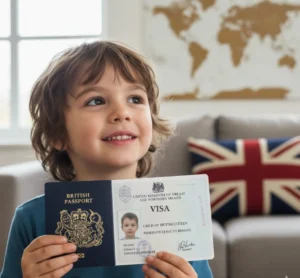Children of British Citizens Visa: Complete Guide for 2025
If you’re a British citizen or settled person living in the UK, bringing your child to join you might feel like it should be simple. After all, they’re your child. But UK immigration rules can be tricky, especially when parents are separated or living in different countries.
The good news? With the right preparation and understanding of what the Home Office needs to see, your child can join you in the UK. This guide walks you through everything you need to know about child visa applications in 2025.
Our immigration lawyers in Manchester are ready to assist you in person or via the phone.
What Is a Child of British Citizen Visa?
A child of a British citizen visa allows your son or daughter to come to the UK and live with you. It’s part of the UK’s family visa applications system, which recognises that families should be together.

Your child might be able to come to the UK with immediate settlement (meaning they get indefinite leave to remain straight away), or they might need to apply for limited leave first, depending on your circumstances.
The UK Visas and Immigration department handles these applications. They’ll look at your relationship with your child, your financial situation, and whether you can provide proper accommodation.
Who Can Apply for a UK Child Visa?
Not every child qualifies for this type of visa. Let’s break down who can apply.
Children of British Citizens
If you’re a British citizen living in the UK, your child under 18 can apply to join you. This includes biological children, adopted children, and stepchildren in some cases.
The key is proving the parent-child relationship exists. You’ll need official documents like birth certificates showing your name as the parent.
Children of Settled Persons
Don’t have British citizenship yet? If you have indefinite leave to remain (ILR) or settled status, your child can still apply. The same rules apply as for British citizens.
People with settled status under the EU Settlement Scheme also count as settled persons for these purposes.
Age Requirements for Child Visas
Your child must be under 18 when the UKVI makes a decision on their application, not just when you submit it. This matters for teenagers getting close to their 18th birthday.
If your child turns 18 during the application process, you might need to switch to an adult dependent application instead. Time is important here.
Types of Child Visa Applications in the UK
There are several routes your child might use to come to the UK. The right one depends on whether they’re currently outside the UK or already here, and your specific situation.
Entry Clearance for Indefinite Leave to Enter (ILE) as a Child
This is the gold standard application. Your child applies from outside the UK and, if successful, gets immediate settlement. They won’t need to renew their visa or worry about time limits.
This route works when both parents are in the UK (either as British citizens or with ILR), or when one parent is here and has sole responsibility for the child.
Indefinite Leave to Remain as a Child (SET(F) Application)
If your child is already in the UK on a limited visa, they can apply for ILR once they’ve been here continuously. This is called a SET(F) application.
The continuous residence requirement usually means they’ve been in the UK lawfully without significant absences. Check the specific requirements for your situation.
Child of Someone with Partner or Parent Visa
Got a spouse visa or parent of a British child visa? Your child can apply as your dependent. They’ll get the same length of leave as you, and follow your route to settlement.
This is useful when you’re on a limited visa yourself but want your child with you during that time.
Leave to Remain Application for Children
Sometimes children need to apply for limited leave first, rather than going straight to ILR. This happens in cases where they don’t yet meet the continuous residence requirements or when parents are on limited visas themselves.
These applications are similar in requirements but give time-limited permission rather than settlement.
Sole Responsibility Requirement: What You Need to Know
Here’s where things get complicated for many families. The sole responsibility requirement trips up lots of applications.
When Is Sole Responsibility Required?
If both parents aren’t in the UK together, and you want to sponsor your child’s visa, you’ll usually need to prove sole responsibility. This means showing you’ve been the main decision-maker and carer for your child.
It’s not enough that the other parent agrees to the move. The Home Office wants to see you’ve actually been responsible for the child’s upbringing.
How to Prove Sole Responsibility
Sole responsibility isn’t about being the only person who cares for your child. It’s about being the person who makes the important decisions about their life.
Think about who decides where they go to school, what medical treatment they get, and how they’re raised day-to-day. If that’s been you, you likely have sole responsibility.
Evidence for Sole Responsibility Claims
You’ll need paperwork to back this up. Here’s what helps:
Financial records showing you’ve paid for the child’s needs. Bank statements with regular transfers to support your child work well. School records with you listed as the main contact person. Medical records showing you attend appointments and make healthcare decisions. Letters from schools, doctors, or social workers confirming your role.
Official custody documents help but aren’t essential if you can show sole responsibility through other evidence.
Eligibility Requirements for Children of British Citizens
Beyond the basic qualifying criteria, there are specific requirements every application must meet.
Our immigration lawyers in Manchester are ready to assist you in person or via the phone.
Relationship Requirements
You need to prove you’re actually the parent. A birth certificate is the starting point, but the Home Office might want more if your name isn’t on the certificate or if there’s any doubt.
DNA tests can be arranged through the British Embassy if needed, though this adds time and cost to your application.
Financial Requirements for Child Visas
You must show you can support your child without accessing public funds. The exact amount varies, but you generally need to demonstrate adequate maintenance.
Accommodation Requirements
Where will your child sleep? You need to show you have adequate accommodation that won’t be overcrowded when your child arrives.
The Home Office checks whether the property meets UK housing standards and has enough space. You’ll need a tenancy agreement or mortgage statement, plus sometimes an inspection report from your local council.
English Language Requirements (When Applicable)
Children under 18 generally don’t need to pass an English test for these applications. However, if your child is 16 or 17 and applying for certain visa types, there might be language requirements.
This is different from the Life in the UK test, which only applies to citizenship applications later on.
Documents Needed for a Child Visa Application
Getting your documents right is half the battle. Missing paperwork is one of the main reasons applications get delayed or refused.
Identity Documents
Your child needs a valid passport with at least six months remaining. You’ll also need your own British passport or proof of ILR.
Birth certificates for your child showing your name are essential. If the document isn’t in English, you’ll need a certified translation.
Relationship Evidence
Photos of you and your child together over time help prove your ongoing relationship. If you’ve been living apart, you’ll need evidence of regular contact like phone records, messages, or video call logs.
Letters from family members, teachers, or community leaders confirming your relationship can strengthen your application.
Financial Documents
Recent payslips covering at least six months show stable income. Bank statements proving you have savings or regular deposits work too. If you’re self-employed, you’ll need business accounts and tax returns.
Accommodation Proof
Your tenancy agreement or mortgage statement must show you’re legally occupying the property. A letter from your landlord confirming the child can live there helps.
If you’re renting, you might need to check your tenancy allows additional occupants. Some landlords restrict the number of people living in a property.
How to Apply for a Child Visa UK
The application process has several steps. Getting them right saves time and stress.
Application Process Step by Step
First, your child completes the online application form on the UK government website. You’ll pay the application fee and the Immigration Health Surcharge at this stage.
Next, you’ll book an appointment at a visa application centre in your child’s country. They’ll give biometric information (fingerprints and photo) and submit supporting documents.
Then it’s a waiting game while UKVI processes the application. They might ask for additional information or documents during this time.
Where to Submit Your Application
Your child must apply from outside the UK for entry clearance applications. They can’t switch to this visa type if they’re already in the UK as a visitor, for instance.
If they’re already in the UK on a different visa, they might be able to apply to switch from inside the UK. This depends on their current visa type and the specific application route.
Processing Times and Priority Services
Standard processing takes around three weeks for straightforward applications from most countries. Complex cases involving sole responsibility can take several months.
Priority services cost extra but speed things up significantly. Super priority services can give you a decision within 24 hours in some countries, though this service isn’t available everywhere.
Maria from Manchester is applying for her daughter from Brazil. She pays for priority processing because her daughter’s school term starts in September. This costs an additional £500 but gets a decision within five working days.
Child Visa Fees and Costs
Let’s talk money. Child visa applications aren’t cheap, but knowing the costs helps you budget properly.
Home Office Application Fees
In 2025, the Home Office charges £1,938 for a child settlement visa application made outside the UK, and £1,321 if the application is made inside the UK. The fee is the same for every extra dependent family member.
These fees change regularly, so check the current rates on the government website when you’re ready to apply.
Immigration Health Surcharge
Your child needs to pay the Immigration Health Surcharge (IHS) to access NHS services. The annual IHS fee for applicants under the age of 18 is £776 per year. The higher rate of £1,035 is for adults.
Additional Costs to Consider
Don’t forget about translation costs if your documents aren’t in English. Certified translations usually cost £30-£50 per document.
You might also need to pay for priority services, courier fees to return documents, and travel costs for your child to attend their biometric appointment.
What Happens After Approval?
Your child’s visa is approved. Now what?
Rights and Restrictions
With ILR, your child can work (once old enough), study, and access public services without restrictions. They can come and go from the UK freely, though long absences might affect their status.
Children on limited leave have similar rights but must extend their visa before it expires.
Path to Settlement
If your child comes on limited leave rather than ILR, they can usually apply for settlement after five years of continuous residence. They’ll need to meet the requirements at that time too.
Once they have ILR and have lived in the UK for at least 12 months, they can apply for British citizenship if eligible.
Common Reasons for Child Visa Refusals
Understanding why applications fail helps you avoid the same mistakes.
Inadequate Financial Evidence
The Home Office refuses applications when they’re not convinced you can support your child financially. Vague statements like “I earn enough” don’t work.
You need specific evidence with dates, amounts, and sources clearly shown. Bank statements should cover at least six months and match your stated income.
Sole Responsibility Issues
This is the biggest stumbling block. Many parents assume their child can join them automatically, but the Home Office needs clear proof of sole responsibility when parents are separated.
Simply saying the other parent agrees isn’t enough. You need evidence showing you’ve been making the decisions about your child’s life for a significant period.
Relationship Documentation Problems
Sometimes the Home Office doubts the genuine nature of the parent-child relationship. This happens when there’s limited contact evidence or inconsistencies in the application.
If you’ve been apart from your child for years, explain why and show evidence of maintaining the relationship through regular contact, financial support, and involvement in their life.
Our immigration lawyers in Manchester are ready to assist you in person or via the phone.
Other Visa Routes
Not every child qualifies under the standard child visa routes. Here are some alternatives worth knowing about.
The 7-year child residence rule allows children who’ve lived in the UK continuously for seven years to apply for settlement based on their private life here.
Surrogate children visa applications have specific requirements if your child was born through surrogacy arrangements.
A private life visa might work if your child has been in the UK for years and removing them would breach their human rights.
These routes are more complex and usually need specialist advice to get right.
What If Your Child Visa Is Refused?
Refusals happen, but they’re not always the end of the road.
You can request an administrative review if you think the Home Office made an error in considering your application. This must be done within strict time limits (usually 14 days).
Challenging a visa refusal might involve an administrative review or, in human rights cases, an appeal to the tribunal.
Sometimes it’s better to address the reasons for refusal and submit a new application with stronger evidence.
How Immigration Solicitors in Manchester Can Help
Child visa applications look straightforward on paper but often involve complicated evidence requirements and legal arguments.
Our team at Solicitors in Manchester works with families like yours every day. We know which evidence convinces caseworkers and how to present your case in the strongest possible way.
We can help you gather the right documents, prepare written representations explaining your circumstances, and submit your application with the best chance of success.
For sole responsibility cases in particular, having a solicitor who understands what the Home Office looks for makes a huge difference. We’ve successfully helped parents bring their children to the UK even in complex situations involving separated families.
We offer fixed fees so you know exactly what you’ll pay, with no hidden costs or surprises. Many clients appreciate the peace of mind that comes from having UK visa services handling their application professionally.
Your child deserves to be with you. Let us help make that happen. Get a free visa assessment to discuss your specific situation and find out how we can support your family’s visa application.
We’re here to help you bring your family together in the UK.
Our immigration lawyers in Manchester are ready to assist you in person or via the phone.
- What Is a Child of British Citizen Visa?
- Who Can Apply for a UK Child Visa?
- Children of British Citizens
- Children of Settled Persons
- Age Requirements for Child Visas
- Types of Child Visa Applications in the UK
- Entry Clearance for Indefinite Leave to Enter (ILE) as a Child
- Indefinite Leave to Remain as a Child (SET(F) Application)
- Child of Someone with Partner or Parent Visa
- Leave to Remain Application for Children
- Sole Responsibility Requirement: What You Need to Know
- When Is Sole Responsibility Required?
- How to Prove Sole Responsibility
- Evidence for Sole Responsibility Claims
- Eligibility Requirements for Children of British Citizens
- Relationship Requirements
- Financial Requirements for Child Visas
- Accommodation Requirements
- English Language Requirements (When Applicable)
- Documents Needed for a Child Visa Application
- Identity Documents
- Relationship Evidence
- Financial Documents
- Accommodation Proof
- How to Apply for a Child Visa UK
- Application Process Step by Step
- Where to Submit Your Application
- Processing Times and Priority Services
- Child Visa Fees and Costs
- Home Office Application Fees
- Immigration Health Surcharge
- Additional Costs to Consider
- What Happens After Approval?
- Rights and Restrictions
- Path to Settlement
- Common Reasons for Child Visa Refusals
- Inadequate Financial Evidence
- Sole Responsibility Issues
- Relationship Documentation Problems
- Other Visa Routes
- What If Your Child Visa Is Refused?
- How Immigration Solicitors in Manchester Can Help
Why Choose Solicitors in Manchester For Your UK Visa & Immigration Cases?
Looking for trusted immigration solicitors in Manchester? We offer expert legal advice for all UK visa and immigration matters. Our team is here to make your visa application process smooth, simple, and stress-free.
Experienced Immigration Solicitors
Our team has years of experience and stays up to date with the latest UK immigration rules. We give you accurate and honest legal advice.
Personalised Legal Support
Every visa case is different. We take the time to understand your situation and offer solutions that are tailored specifically for you.
Fast Visa Services
Need a quick decision? We offer Priority and Super Priority visa services to accelerate your application and get you faster results.
Online & In-Person Services
We can handle your case online or in person at our Manchester office—saving you time and travel costs. Flexible support to suit your needs.
Open 7 Days a Week
We’re available every day, including weekends, to offer expert immigration advice when you need it most. Your case doesn't have to wait.
Free Initial Advice & Fixed Fees
Call us for a free 5-minute initial advice session. We offer clear, affordable pricing with instalment options—no hidden costs.
Ready to Start Your Journey?
At Immigration Solicitors in Manchester, we are committed to providing professional, fast, and reliable immigration services.








